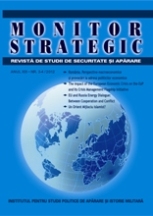Germania și multilateralismul în contextul securității europene
Germany and multilateralism in the context of European security
Author(s): Sorin-Vasile NegoiţăSubject(s): International relations/trade, Security and defense, Nationalism Studies
Published by: Editura Militară
Keywords: multilateralism; nationalism; cooperation; common action; relationship; european security;
Summary/Abstract: Immediately after the end of the Second World War, in a divided Europe in the West and East, the political elite of West Germany, based on the historical experience of the German state, attempted to promote a foreign policy based on cooperation and multilateralism, an essential component of the identity of the German nation. This has been materialized in the belief that the guarantee of national security can be resolved by maintaining cooperation relations with both the US and Western European states through NATO and the European Community, then the European Union, but also with the other European states that are members of the Treaty of Warsaw, by promoting the so-called Ostpolitik. After the end of the Cold War, the fall of the Berlin Wall and the reunification, Germany, no matter what political party was at the head of the country, continued its foreign policy based on cooperation between nations and joint action, emphasizing the support and protection of multilateralism. At present, Germany is an insistent supporter of the idea of multilateralism, present in all declarations of the German political leadership at all the fora in which they participate (the UN Security Council, the European Council or the Munich conference) committed to contributing to the stabilization of Europe and to resist the return of nationalism to Europe.
Journal: Monitor Strategic
- Issue Year: 2019
- Issue No: 1-2
- Page Range: 29-43
- Page Count: 15
- Language: Romanian

